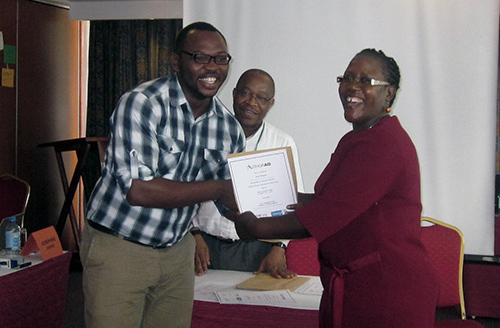AuthorAID sponsored gender sensitization workshop creates gender awareness in the work of PASGR staff and partners in Nairobi
Guest Post by Dr. Pauline Ngimwa, Programme Manager, Professional Development and Training, Partnership for African Social and Governance Research (www.pasgr.org)
”...good policies address our state of being. Good policies that address the totality of our population and diversity cannot be made without good gender analysis... bad science produces bad policies, and bad policies – whether in health, education, transport, or agriculture – kill people...”
These remarks by Prof. Tade Aina, Executive Director of the Partnership for African Social and Governance Research (PASGR), Nairobi during a recent PASGR’s gender sensitization workshop sponsored by INASP’s AuthorAID project show why the meeting was organized.

PASGR’s mission is to advance research excellence for governance and public policy in Africa. PASGR is convinced that gender is an important conceptual handle for analysing the different and complex dimensions of political, social and economic actions and is therefore critical for good social science research. Therefore, we intentionally integrate gender into our operations and programming.
Towards the end of 2015, PASGR undertook a gender evaluation. The study established that although PASGR staff were generally gender aware and appreciated gender differences, they lacked the requisite sensitivity to ensure that their core functions were gender responsive.
Based on the findings of the study, we organized a gender sensitization workshop in March 2016. This workshop sought to create awareness of gender in the work of PASGR among staff and partners. The two-day workshop took place in Nairobi with financial support from AuthorAID. PASGR staff and selected partners from the three mainstream programmes, i.e. Professional Development and Training, Higher Education, and Research attended the training. The facilitator, Prof. Josephine Ahikire (a gender scholar and the Dean, School of Women and Gender Studies at Makerere University) had conducted the gender evaluation mentioned above and therefore understood exactly where the organization was in terms of gender sensitivity.
A pre-workshop online assignment had revealed that most participants were gender aware. Participants already knew distinctions between gender and sex and the basic discourse around gender such as roles and gender disparities in various sectors. Therefore the workshop had to introduce foundational debates on what it would take to institutionalize gender in organizational policy and programming.
Another aspect that became obvious at the onset was the diverse mix of participants. There were very experienced social science scholars who had a good grasp of gender issues and wanted to go beyond the “what” question to “how to”. In the same room were some who did not fully understand the concept of gender but were extremely interested in how gender affects work relations and programme activities. To accommodate the needs of both groups, the facilitator focused the conversation around the “what” and “why” questions of gender sensitivity.
Participants discussed the levels of gender equality, distinguishing between material inequality and that which often takes a subtle ideological and systemic form. Buzz groups, larger group discussions and debate made the conversations during the workshop realistic and relevant to all present. Humour characterized how the participants engaged with the facilitator and each other, making the learning exciting and interesting. Humour also helped defuse the emotions that often arise in conversations about gender.
The facilitator invited participants to share recommendations for uptake moving forward. It was agreed that PASGR’s commitment to integrating gender in its operations and in re-invigorating gendered knowledge production in public policy are moves in the right direction.
In the facilitator’s words, this was a remarkable workshop that demonstrated great dedication right from the top to the other levels of the staff hierarchy. Participants were highly committed and treated the issues with the seriousness they deserved. Although not all participants’ learning expectations could be crammed into two days, it was evident that the participants had been energized and armed with a basic knowledge on gender relations by the end of the workshop. The next step is to develop knowledge and skills on how to integrate gender according to the different needs and work of PASGR.
